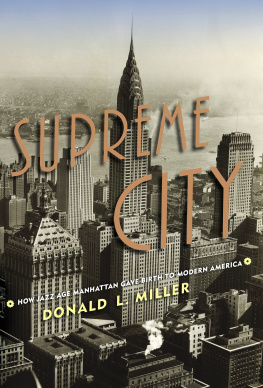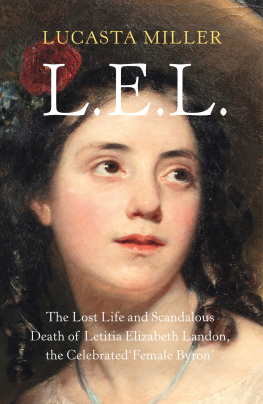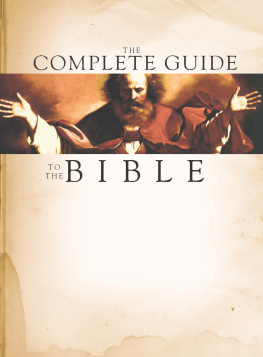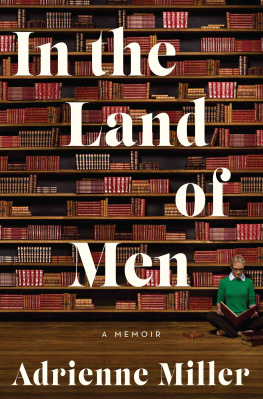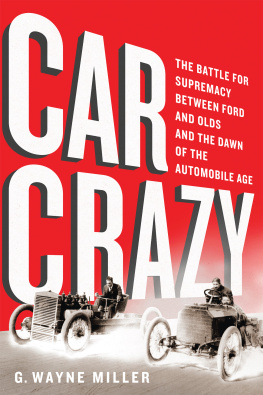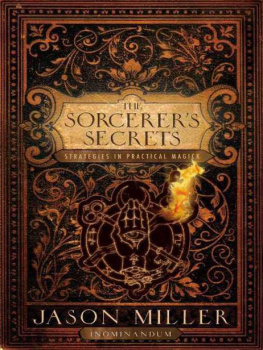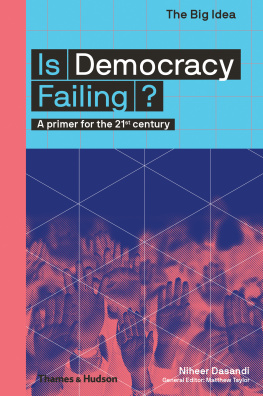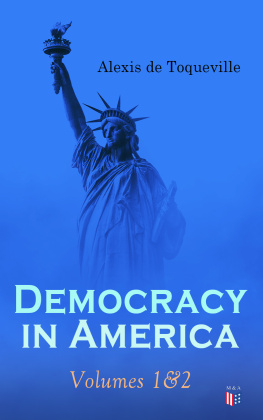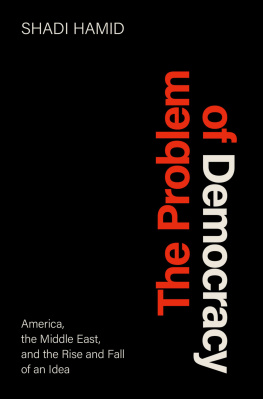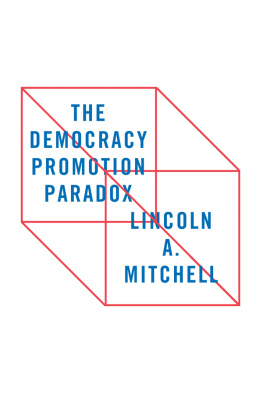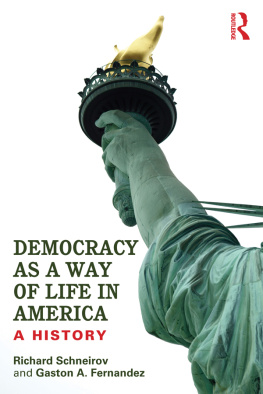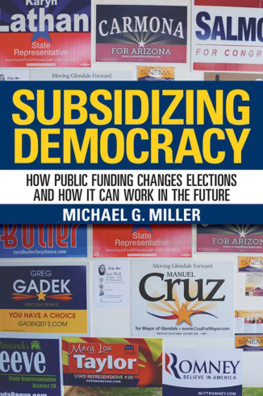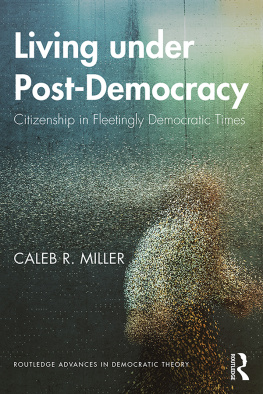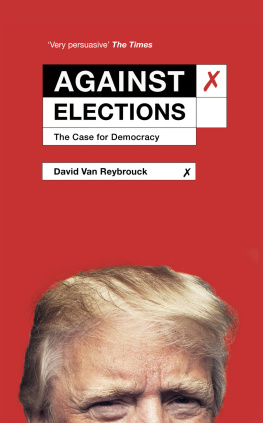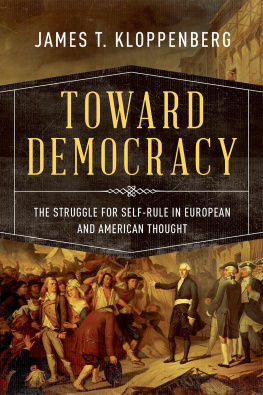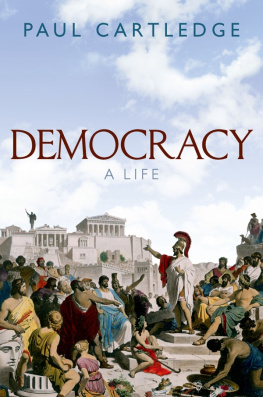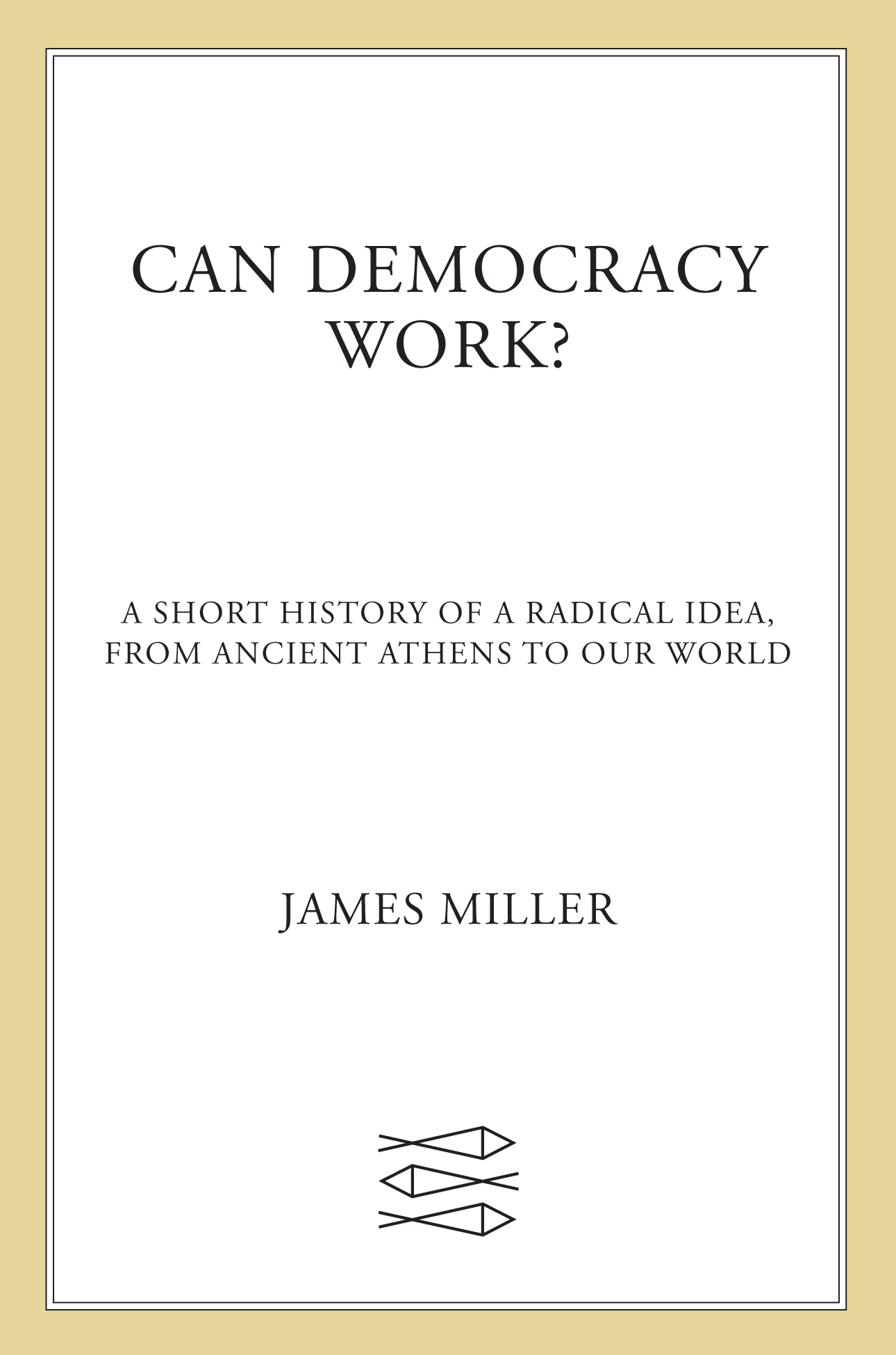Contents
Guide
Pagebreaks of the print version

The author and publisher have provided this e-book to you for your personal use only. You may not make this e-book publicly available in any way. Copyright infringement is against the law. If you believe the copy of this e-book you are reading infringes on the authors copyright, please notify the publisher at: us.macmillanusa.com/piracy.
Once more for Ruth; for Alexander, Michael, and Benjamin; and to those born later
When the time comes at last
And man is a helper to man
Think of us
With forbearance.
Bertolt Brecht, To Those Born Later (1940)
We have frequently printed the word Democracy. Yet I cannot too often repeat that it is a word the real gist of which still sleeps, quite unawakend, notwithstanding the resonance and the many angry tempests out of which its syllables have come, from pen or tongue. It is a great word, whose history, I suppose, remains unwritten, because that history has yet to be enacted.
Walt Whitman, Democratic Vistas (1870)
A GREAT DEMOCRATIC REVOLUTION is going on amongst us, Alexis de Tocqueville wrote in 1835, in the aftermath of the United States War of Independence and the French Revolution. Like many observers of the modern democratic ideal, the French social theorist found many of its implications troubling, if left unchecked. Yet with twists and turns, and despite some spectacular setbacks, the great democratic revolution that Tocqueville described indeed continued, sometimes flaring up with disturbing results, throughout the twentieth century and into the twenty-first.
Tocqueville was one of the first in a long line of modern writers who have believed that democracy in some sense represented a logical culmination of human affairs: for Francis Fukuyama, writing in 1989, the year that jubilant Germans tore down the Berlin Wall, liberal democracy marked the end of history, with an American exclamation point.
But history hasnt evolved in quite the way that these theorists anticipated. Tocqueville expected democracy to produce greater equalityyet democratic states conjoined with market societies have recurrently produced growing in equality. At the same time, as nations have grown larger, and as new transnational institutions have changed the everyday life of millions, those who govern have become increasingly remote, often making democracy in practice seem like a puppet show, a spectacle in which hidden elites pull all the stringsnot a great word with a history that has yet to be enacted.
But democracy amazingly enough survivesat least as an article of faith or a figment of modern ideology. As one recent empirical study sums up the evidence: If we take the number of people who claim to endorse democracy at face value, no regime type in the history of mankind has held such universal and global appeal as democracy does today. In a striking contrast to the low regard in which democracy was held throughout most of the rest of recorded human history, virtually every existing political regime today claims to embody some form of democracy. Vladimir Putin and his supporters have declared Russia to be a sovereign democracy. Even North Korea calls itself a Democratic Peoples Republic.
It is often assumed that democracy emerged as a global political norm as the result of a gradual evolution, realizing the best in a great heritage of Western political thought. A suspiciously reassuring tradition is then taken for granted. First practiced by the ancient Athenians, fruitfully justified in the republican theories of Aristotle and his successors, developed through the struggles between people and king in England, democracy finally bursts into full bloom, most notably in the United States.
This account is misleading. Democracy before the French Revolution was generally held to be a fools paradise, or worse. At the zenith of direct democracy in ancient Athens, one critic called it a patent absurdityand so it seemed for centuries afterward to political theorists from Plato to James Madison.
It was only in the eighteenth century that theorists and militants resurrected democracy as an articulate ideal. In France, inspired primarily by the radical ideas of Jean-Jacques Rousseau and the revolutionary journalists and political leaders who championed his ideas, the common people of Paris for a few months in 1792 and 1793 practiced their own form of direct democracy in local assemblies, now and then augmented through armed insurrections. In response to the radical demands of these latter-day Parisian democrats, some political observers advocated a new, indirect form of self-government, a novel regime they called (as had a few Americans before them) a representative democracy. Instead of exercising sovereignty directly, the people in a modern democracy should exercise it in directly, by transferring their power to elected representatives. Under the pressure of events, one of the most ardent of modern French democrats, Robespierre, went farther and defended the need, in the midst of a democratic revolution, for a temporary dictatorshipprecisely to preserve the possibility of building a more enduring form of representative democracy once the revolution was complete and law and order were restored.
Ever since the French Revolution, modern democracy has oscillated between the gradual evolution of representative democracy and radical challenges to this evolving status quo, issuing in demands for more, not less, democracy, often in conjunction with demands for a reformation of the distribution of wealth, and sometimes (as in Russia after 1917) resulting in new forms of avowedly democratic dictatorships. Notable among these revolts are the Chartist uprisings of 1839, and the Chartist general strike of 1842 in Great Britain; the European revolutions of 1848, and the Paris Commune of 1871; the soviet uprisings of 1905 and 1917, and the workers councils they inspired in Germany, Hungary, and Italy; the anticommunist workers councils in Hungary in 1956, Solidarity in Poland in 1980, and the Velvet Revolution in Czechoslovakia in 1989. Or consider more recent events, from the ill-fated Arab Spring uprisings of 2011 and the Maidan revolt in Ukraine in 2013 to the so-called umbrella revolution of Hong Kong in 2014or even the Brexit leave vote in the United Kingdom in 2016, mobilized under the slogan Take back control.
Recent events in the United States have been similarly tumultuous. Recall the hopes for a wider and more direct popular participation in politics briefly raised in the presidential election of 2008, when Barack Obama rallied previously indifferent voters on a platform of social changeand then recall the rapid fading of these hopes, and the subsequent rise of grassroots movements that saw themselves as battling for more democracy, such as the Tea Party on the right and the Occupy Wall Street and the Black Lives Matter movements on the left, climaxed by the populist revolt in 2016 against the established political elites led, improbably enough, by the billionaire showman Donald J. Trump.
What is at stake in these contradictory and often controversial political developments? What, if anything, do modern representative democracies have in common with the dictatorial democracies of contemporary communist regimes, or with such avowedly direct democratic movements as Occupy Wall Street or Spains Indignados?
If both North Korea and the United States consider themselves democraticand if liberals and conservatives, and socialists and communists, and nationalists and populists, and American politicians of every stripe can all claim to embody the will of a peoplethen what, in practice, can the idea of democracy possibly mean ?


